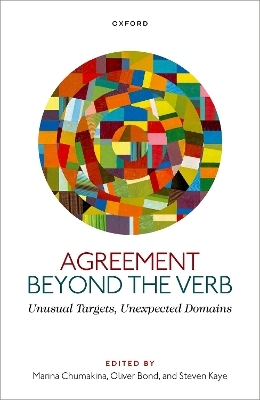
Agreement beyond the Verb
Oxford University Press (Verlag)
978-0-19-289756-5 (ISBN)
This book explores unusual patterns of agreement, one of the most intriguing and theoretically challenging aspects of human language. Agreement is typically thought to reflect a structural relationship between a verb and its arguments within the clause, and all major theories of agreement have been developed with the centrality of this relationship in mind. But beyond the verb, items belonging to practically every other part of speech have been found to function as agreement targets, including adpositions, adverbs, converbs, nouns, pronouns, complementizers, and other conjunctions. Data on these targets provide rich insights into the structural domains in which agreement operates, demonstrating that unusual targets can be associated with unexpected domains that are independent of the agreement domain of the verb.
Following an introduction to the typology of unusual targets and unexpected domains across the world's languages, the chapters in this volume provide detailed treatments of a wide range of rare and complex agreement phenomena in seven languages, belonging to five different language families of Eurasia and the Pacific. The contributions are all based on novel data collected by the authors, which detail the syntactic, semantic, and pragmatic properties of agreement on non-verbal targets within the clause.
Marina Chumakina is a Research Fellow in the Surrey Morphology Group, University of Surrey. Her research involves syntax-morphology interface problems viewed from a typological perspective. She has conducted extensive fieldwork on Nakh-Daghestanian languages of the Russian Federation, such as Tsakhur (Lezgic), Bagwalal (Andic), Andi (Andic), and Khwarshi (Tsezic), with a special focus on Archi (Lezgic). She is co-editor of Canonical Morphology and Syntax (OUP, 2012), Periphrasis: The Role of Syntax and Morphology in Paradigms (BA/OUP, 2013), and Archi: Complexities of Agreement in Cross-Theoretical Perspective (OUP, 2016). Oliver Bond is Reader in Linguistics in the Surrey Morphology Group, University of Surrey. His research explores the syntactic and information-structural evidence for the ways that speakers monitor, encode, and interpret reference to discourse participants using agreement and/or case marking in different linguistic systems. His fieldwork has focused on Eleme (Niger-Congo; Nigeria), Nuer (Nilo-Saharan; South Sudan, Ethiopia) and the Tibeto-Burman languages Gurung, Gyalsumdo, Manange, and Nar-Phu, spoken in Manang District, Nepal. He is co-editor of Archi: Complexities of Agreement in Cross-Theoretical Perspective (OUP, 2016), Prominent Internal Possessors (OUP, 2019), and Morphological Perspectives (Edinburgh University Press, 2019). Steven Kaye is a Research Fellow in the Surrey Morphology Group, University of Surrey. He studied Comparative Philology and General Linguistics at the University of Oxford, where his DPhil thesis (2015) examined the development of mixed ('heteroclite') inflection in the Italic and Romance verb. Since 2008 he has also carried out research on languages of the Caucasus, including fieldwork on Northern Talyshi (Indo-European; Azerbaijan), and most recently on Andi (Nakh-Daghestanian; Russia). His research interests include morphological typology, language description, grammaticalization theory, and Indo-European historical linguistics.
Preface
1: Oliver Bond, Marina Chumakina, and Steven Kaye: Unusual agreement targets in unexpected domains
2: Steven Kaye: Agreement between arguments in Andi
3: Nina Sumbatova: Agreement of essive adverbials in Tanti Dargwa
4: Marina Chumakina: Agreeing adverbs in Enets
5: Tania Paciaroni: Unusual agreement targets in Ripano
6: Marina Chumakina and Ekaterina Lyutikova: External agreement in Khwarshi
7: Bruno Olsson: Agreeing postpositions and unexpected agreement in Coastal Marind
8: Alexander Rostovtsev-Popiel: Case-shift on Megrelian adverbs
References
Index
| Erscheinungsdatum | 05.12.2023 |
|---|---|
| Verlagsort | Oxford |
| Sprache | englisch |
| Maße | 160 x 240 mm |
| Gewicht | 642 g |
| Themenwelt | Geisteswissenschaften ► Sprach- / Literaturwissenschaft ► Sprachwissenschaft |
| ISBN-10 | 0-19-289756-X / 019289756X |
| ISBN-13 | 978-0-19-289756-5 / 9780192897565 |
| Zustand | Neuware |
| Informationen gemäß Produktsicherheitsverordnung (GPSR) | |
| Haben Sie eine Frage zum Produkt? |
aus dem Bereich


